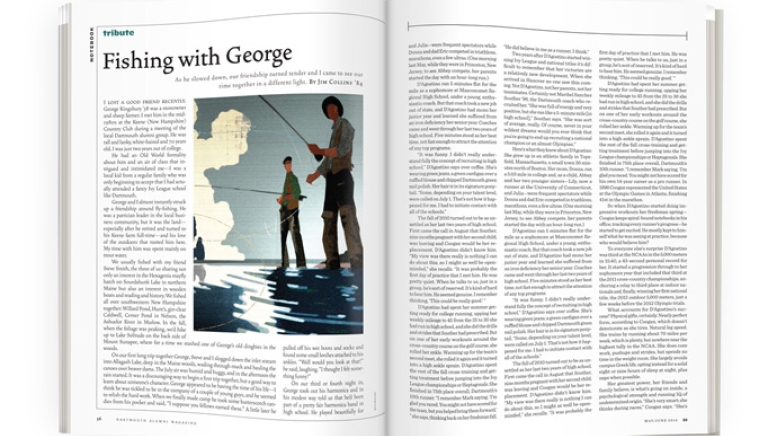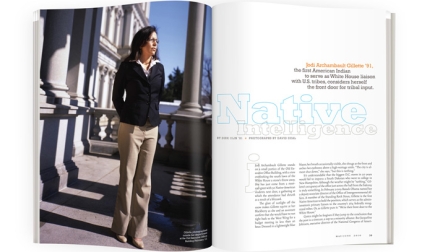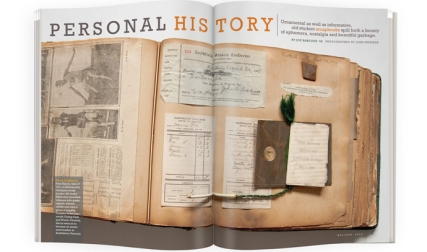I lost a good friend recently. George Kingsbury ’38 was a storeowner and sheep farmer. I met him in the mid-1980s at the Keene (New Hampshire) Country Club during a meeting of the local Dartmouth alumni group. He was tall and lanky, white-haired and 70 years old. I was just two years out of college.
He had an Old World formality about him and an air of class that intrigued and intimidated me—I was a local kid from a regular family who was only beginning to accept that I had actually attended a fancy Ivy League school like Dartmouth.
George and I almost instantly struck up a friendship around fly-fishing. He was a patrician leader in the local business community, but it was the land—especially after he retired and turned to his Keene farm full-time—and his love of the outdoors that rooted him here. My time with him was spent mainly on trout water.
We usually fished with my friend Steve Smith, the three of us sharing not only an interest in the Hexagenia mayfly hatch on Sourdahunk Lake in northern Maine but also an interest in wooden boats and reading and history. We fished all over southwestern New Hampshire together: Willard Pond, Hunt’s, gin-clear Caldwell, Center Pond in Nelson, the Ashuelot River in Marlow. In the fall, when the foliage was peaking, we’d hike up to Lake Solitude on the back side of Mount Sunapee, where for a time we stashed one of George’s old dinghies in the woods.
On our first long trip together George, Steve and I slogged down the inlet stream into Allagash Lake, deep in the Maine woods, wading through muck and hauling the canoes over beaver dams. The July air was humid and buggy, and in the afternoon the rain started. It was a discouraging way to begin a first trip together, but a good way to learn about someone’s character. George appeared to be having the time of his life—I think he was tickled to be in the company of a couple of young guys, and he seemed to relish the hard work. When we finally made camp he took some butterscotch candies from his pocket and said, “I suppose you fellows earned these.” A little later he pulled off his wet boots and socks and found some small leeches attached to his ankles. “Well would you look at that!” he said, laughing. “I thought I felt something funny!”
On our third or fourth night in, George took out his harmonica and in his modest way told us that he’d been part of a pretty fair harmonica band in high school. He played beautifully for us—that sounds odd, I know, talking about a harmonica, but I’d never heard anything like it—as a fire burned at our feet and a soft rain pattered on the tarp above us. Talk about the band drifted into talk about high school in general and then college and to two summers in the late 1930s when George had hiked in the Tetons in Wyoming. He sounded wistful as he described leaving that wild high country behind and returning home to Keene to go into the family stationer’s business. I know that a part of him stayed out there forever, and that his decision to settle back in New Hampshire was one of the great forks in his life. I understood his decision and I admired him for it, because I had once faced a similar fork and had gone the other way. I felt selfish for my choice, which had been a flip-side of George’s. He had chosen family obligation over a landscape that had enthralled him. I had turned away from my father’s small medical supply business to find my own way, though remaining in a landscape I’d grown up in and was growing to love.
George remained a Main Street merchant until he retired at 60, when he got his sheep and at least a version of the Western ranch he’d privately dreamed of owning. He eventually grew the flock to 225 sheep, one of the largest in the state.
During long days sharing a canoe or wading alongside each other in streams I felt a kinship in the way George appreciated our northern New England surroundings, the way we both loved being out there without caring, really, how many fish we caught. Yet there was much we didn’t talk about. In that sense George was a true Yankee. He talked at length about Zane Grey’s novels and conservation easements, but little about the family tragedies he’d lived through or his field artillery unit in World War II, never about his health. For my part, I would have felt awkward letting him know that he gave me an image of what I hoped to grow into: a vigorous outdoorsman, a gentleman who never lost his boyish sense of enthusiasm, someone at home in the country and the country club. And I could never have found the words to express how he helped me reconcile my sense of place and background and the possibilities of who I was becoming. He was the grandfather I never had.
The outdoors was the currency George and I shared, but we had Keene and Dartmouth in common. He had been a student at Dartmouth in a golden age, when west-central New Hampshire still bordered on wilderness and Dartmouth was building its national reputation as an outdoors school of the first rank. I pictured him as a leader in the Dartmouth Outing Club, a champion skier, an acolyte to Ross McKenney, Dartmouth’s legendary woodcraft advisor who had been a Maine guide and river driver up in the Allagash. That picture I held of George somehow made me feel connected in a lineage.
In fact, he hadn’t done much outdoors at Dartmouth. George had majored in English, run for the track team, been tapped into a senior society for student leaders.
Through the years, though, as our friendship deepened I sensed he might have wished some of that outdoorsy collegiate image I held of him had been true. As his wife, Midge, gradually lost her eyesight and her memory, George no longer dared leave her alone overnight. Steve and I planned shorter fishing outings, with side trips so George could see—for the first time—the 26,000-acre Dartmouth Grant in northern New Hampshire, the DOC’s Ravine Lodge on Mount Moosilauke, the College-owned ski area. George seemed especially excited about the side trips. I think they meant something deep to him.
He was starting to slow down by then and no longer felt safe driving at night. Our friendship turned tender. He begged off of a trip because of a cold, and Steve and I bagged the fishing and brought store-bought salmon to his house for dinner to cheer him up.
By the end of our time fishing together George was growing too stiff to sit in a canoe for very long. He spent less time casting and more time simply watching. He reached for my arm for support walking over rough ground. I tied on his wispy 6x tippet and his tiny #16 dry flies for him; my eyesight was good. He accepted my help absolutely without complaint or apology. He accepted his aging as naturally as he’d accepted the friendship of someone nearly five decades younger than he was. He gave me the rare gift of grace.
And I see clearly now: It was never about the fishing.
Jim Collins lives in Orange, New Hampshire. The University of Utah Press will include a version of this story in its forthcoming anthology of nature writing.




